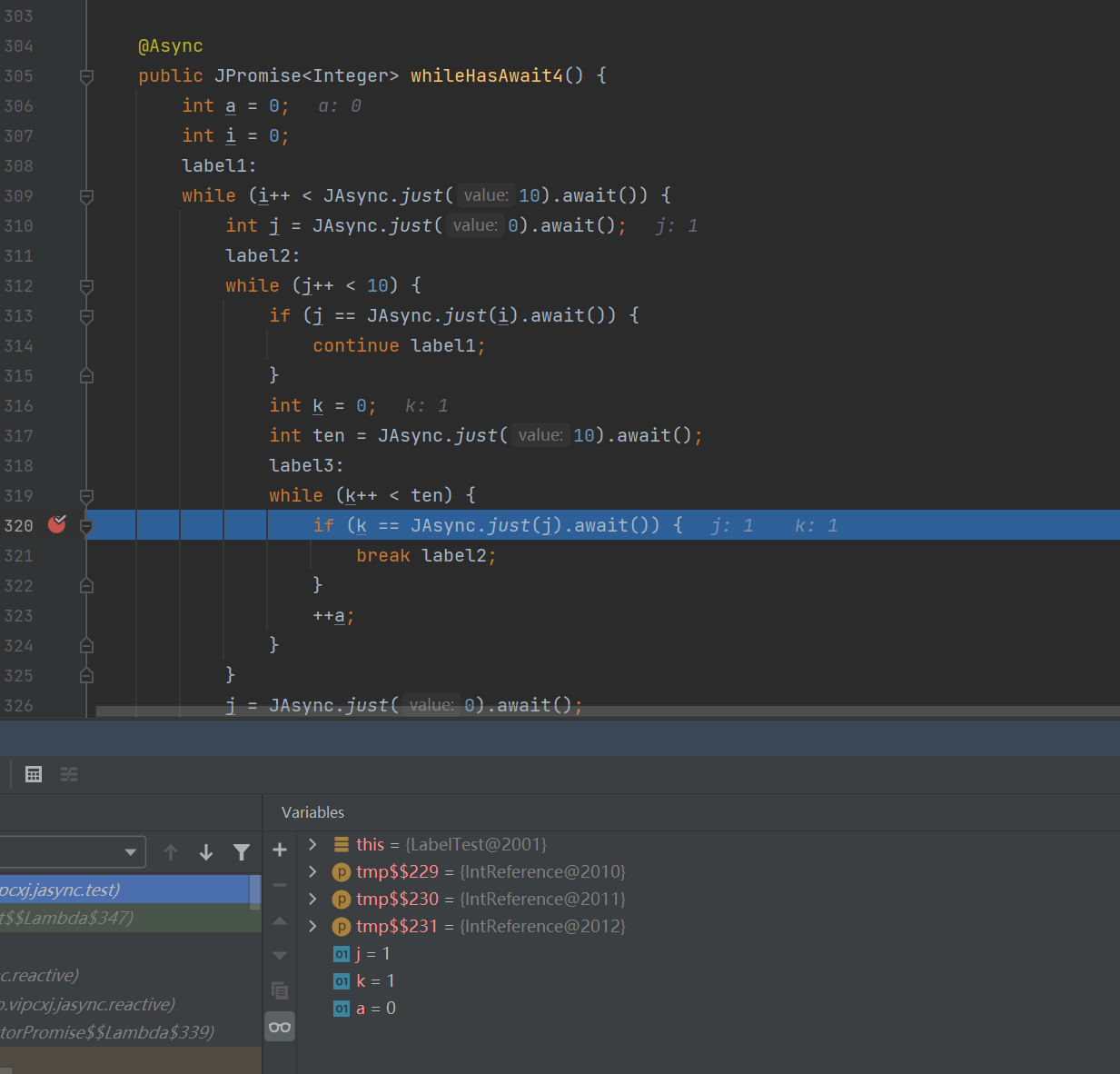JAsync implements Async-Await pattern just like es in Java. It allows developers to write asynchronous code in a sequential fashion. It makes the developer's asynchronous programming experience as close as possible to the usual synchronous programming, including code style and debugging.
On the other hand, this framework separates the realization of the upper-level syntax tree conversion and the lower-level asynchronous workflow through a set of interfaces. This project focuses on the former, while the latter can be achieved by encapsulating existing asynchronous libraries, such as Reactor, RxJava, etc. The advantage of this is that this project can be seamlessly integrated with various asynchronous libraries that have been widely used in the community to produce an effect of 1+1>2.
jdk >= 8
@RestController
@RequestMapping("/employees")
public class MyRestController {
@Inject
private EmployeeRepository employeeRepository;
@Inject
private SalaryRepository salaryRepository;
// The standard JAsync async method must be annotated with the Async annotation, and return a JPromise object.
@Async()
private JPromise<Double> _getEmployeeTotalSalaryByDepartment(String department) {
double money = 0.0;
// A Mono object can be transformed to the JPromise object. So we get a Mono object first.
Mono<List<Employee>> empsMono = employeeRepository.findEmployeeByDepartment(department);
// Transformed the Mono object to the JPromise object.
JPromise<List<Employee>> empsPromise = Promises.from(empsMono);
// Use await just like es and c# to get the value of the JPromise without blocking the current thread.
for (Employee employee : empsPromise.await()) {
// The method findSalaryByEmployee also return a Mono object. We transform it to the JPromise just like above. And then await to get the result.
Salary salary = Promises.from(salaryRepository.findSalaryByEmployee(employee.id)).await();
money += salary.total;
}
// The async method must return a JPromise object, so we use just method to wrap the result to a JPromise.
return JAsync.just(money);
}
// This is a normal webflux method.
@GetMapping("/{department}/salary")
public Mono<Double> getEmployeeTotalSalaryByDepartment(@PathVariable String department) {
// Use unwrap method to transform the JPromise object back to the Mono object.
return _getEmployeeTotalSalaryByDepartment(department).unwrap(Mono.class);
}
}In this example, JAsync rewrite the code like XXX.await() to XXX.thenVoid(v -> { ... }) to making your methods non-blocking.
With JAsync, you can not only enjoy the high throughput of non-blocking programming, but also avoid callback hell and counter-intuitive chained function calls.
@RestController
@RequestMapping("/employees")
public class MyRestController {
@Inject
private EmployeeRepository employeeRepository;
@Inject
private SalaryRepository salaryRepository;
@Async()
private JPromise<Double> _getEmployeeTotalSalaryByDepartment(String department) {
double money = 0.0;
DoubleReference moneyRef = new DoubleReference(money);
Mono<List<Employee>> empsMono = employeeRepository.findEmployeeByDepartment(department);
JPromise<List<Employee>> empsPromise = Promises.from(empsMono);
return empsPromise.thenVoid(v0 -> JAsync.doForEachObject(v0, employee ->
Promises.from(salaryRepository.findSalaryByEmployee(employee.id)).thenVoid(v1 -> {
moneyRef.addAndGet(v1.total);
})
).thenVoid(() -> JAsync.doReturn(JAsync.just(moneyRef.getValue())))).catchReturn();
}
// This is a normal webflux method.
@GetMapping("/{department}/salary")
public Mono<Double> getEmployeeTotalSalaryByDepartment(@PathVariable String department) {
// Use unwrap method to transform the JPromise object back to the Mono object.
return _getEmployeeTotalSalaryByDepartment(department).unwrap(Mono.class);
}
}First, select a implementation library to the Maven dependency. Currently, only one implementation is available.
<dependency>
<groupId>io.github.vipcxj</groupId>
<artifactId>jasync-reactive</artifactId>
<version>0.1.9</version>
</dependency>This implementation uses the famous library Reactor. The JPromise object is a wrapper of Mono object.
So the JPromise object can be created from a Mono object using static method io.github.vipcxj.jasync.reactive.Promises.from(reactor.core.publisher.Mono<T>).
And the JPromise object can be converted back to the Mono object using instance method io.github.vipcxj.jasync.spec.JPromise.unwrap.
Then add the core library to the Maven dependency.
<dependency>
<groupId>io.github.vipcxj</groupId>
<artifactId>jasync-core</artifactId>
<version>0.1.9</version>
<scope>provided</scope>
</dependency>The core library is only need at compile stage, so here use the provided scope. Generally, the annotation processor should be discovered by jdk automatically. However, if something went wrong, jdk can not find the annotation processor, try this:
<plugins>
<plugin>
<artifactId>maven-compiler-plugin</artifactId>
<configuration>
<annotationProcessorPaths>
<path>
<groupId>io.github.vipcxj</groupId>
<artifactId>jasync-core</artifactId>
<version>0.1.9</version>
</path>
</annotationProcessorPaths>
</configuration>
</plugin>
</plugins>Note: If there exists annotationProcessorPaths configure, the dependency configure will not work.
JAsync support a debug mode. With debug mode on, JAsync will inject all useful variable to the current context, even they are not captured. As a result, When debugging, the developer can see all the variables in the monitor window just like debugging normal code.
For example, with debug mode off:
With debug mode on:
It can be seen that when the debug mode is turned on, all the defined variables can be found in the monitoring window.
If you are using Lombok, you should place the JAsync after the Lombok, just like this:
<plugins>
<plugin>
<artifactId>maven-compiler-plugin</artifactId>
<configuration>
<annotationProcessorPaths>
<path>
<groupId>org.projectlombok</groupId>
<artifactId>lombok</artifactId>
<version>1.18.22</version>
</path>
<path>
<groupId>io.github.vipcxj</groupId>
<artifactId>jasync-core</artifactId>
<version>0.1.9</version>
</path>
</annotationProcessorPaths>
</configuration>
</plugin>
</plugins>- Not support new
switchsyntax introduced in java 17. It will be supported in the near future. - Not support ejc (eclipse java compiler). I will try my best to support it. Currently, you can compile the project using maven or gradle, then debug using ejc.


